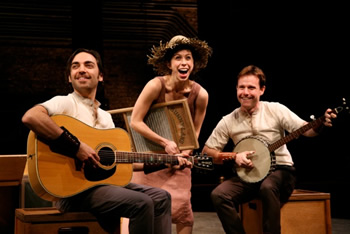The Carolina Theater in downtown Durham was the venue for a benefit concert on a very nice fall day. There were pleasant friends to chat with before and after. There was music to please most everyone: some opera, by Verdi, an African-American spiritual, an overture by Brahms, a memorial tribute, involving music by Bach, and an original piece in honor of a great American hero. The concert benefitted the Center for Child and Family Health and was sponsored by The Cedars of Chapel Hill, and Spice Street. The music was provided by the Durham Symphony Orchestra under the steady and capable hand of William Henry Curry, one of five music-director candidates* being considered to succeed Alan Neilson, who retired in February after 23 years at the helm.
The concert opened with Johannes Brahms’ dramatic “Tragic Overture.” The composer never indicated the nature of the tragedy that occasioned this composition except to say in jest that he wrote it to balance out the joyous “Academic Festival Overture,” composed in the same year (1880). It is not a somber piece but is richly orchestrated and formed by a mature and confident hand between the premieres of his second and third symphonies. The orchestra played exceedingly well and maestro Curry led them in a solid interpretation.
The orchestra was next joined by outstanding soprano Shana Blake Hill, recently heard in composer Bright Sheng’s The Phoenix with the Philadelphia Orchestra under Charles Dutoit. She sang the mesmerizing double aria segment of the final scene of Verdi’s Otello – “Willow Song” and “Ave Maria.” I never hear these two lavish arias without being moved, and Hill’s rich, steady voice, soaring over the orchestra’s magical accompaniment, did the trick.
The Air from Bach’s Orchestral Suite No. 3, in D, was performed with depth and emotion, followed by a moment of silence with the request of no applause as a tribute to an orchestra member and two extended-family memberrs who passed on in the last year. The eloquent architecture of Bach’s music was an ideal choice in this setting and a tribute worthy of all humanity.
Hill rejoined the orchestra for a stunning performance of the recitative and aria “Follie!…Sempre Libera” from Verdi’s La Traviata. Hill’s vocal mastery was like pyrotechnics flashing in the sky and floating gently toward earth.
After intermission, Curry led the orchestra in the Overture to Nabucco, written some 46 or 47 years before Otello – and it showed it. Verdi grew immensely with the development of harmony and the blossoming musical technique of the nineteenth century and to some extent under the influence of Wagner. Nabucco, his first really successful opera, premiered in 1841. Otello was written when he was in his seventies after being lured out of retirement by a libretto based on Shakespeare’s tragic drama; it was first staged in 1887. The contrast was amazing, but Verdi’s genius for melody and dramatic portrayal in music was apparent even in this early work. It was interesting to hear the orchestration and treatment of the opera’s most popular piece, the chorus “Va, Pensiero.” It is reported that the throng of thousands at Verdi’s funeral in 1901 spontaneously burst into this hymn-like chorus of longing and hope.
Hill returned to the stage to sing Curry’s own orchestrated setting of the great African-American spiritual “Ride on King Jesus.” It was a special moment in this concert and an ideal lead-in for the closing selection.
Curry’s “Eulogy for a Dream,” for orchestra and narrator, was premiered in 1999 with the Indianapolis Symphony Orchestra and had its first performance in North Carolina in 2001 with the North Carolina Symphony; the composer conducted on both occasions. It is scored for a fairly large orchestra including harp, tenor saxophone, and mixed percussion. The orchestra is used both sparingly and in full voice, in rich and haunting harmony, and the melodies are reminiscent of African-American spirituals. The narration, powerfully done in this performance by Joseph Henderson, is a summary of some of the most memorable proclamations of the prophet of hope and father of dreams, the Reverend Dr. Martin Luther King, Jr. The overall effect of the performance was one of warmth, inspiration, and satisfaction.
Curry, the Durham Symphony Orchestra, Hill, and Henderson are all indeed Triangle Treasures to be savored whenever possible.
*The first candidate for MD, Andrew McAfee, appeared with the DSO last spring. The remaining candidates – Fouad Fakhouri (of the Fayetteville Symphony), Harry Davidson (of the Duke Symphony Orchestra), and Wayne Wyman (of Capital Opera Raleigh) –will appear later this season. For details, click here.












